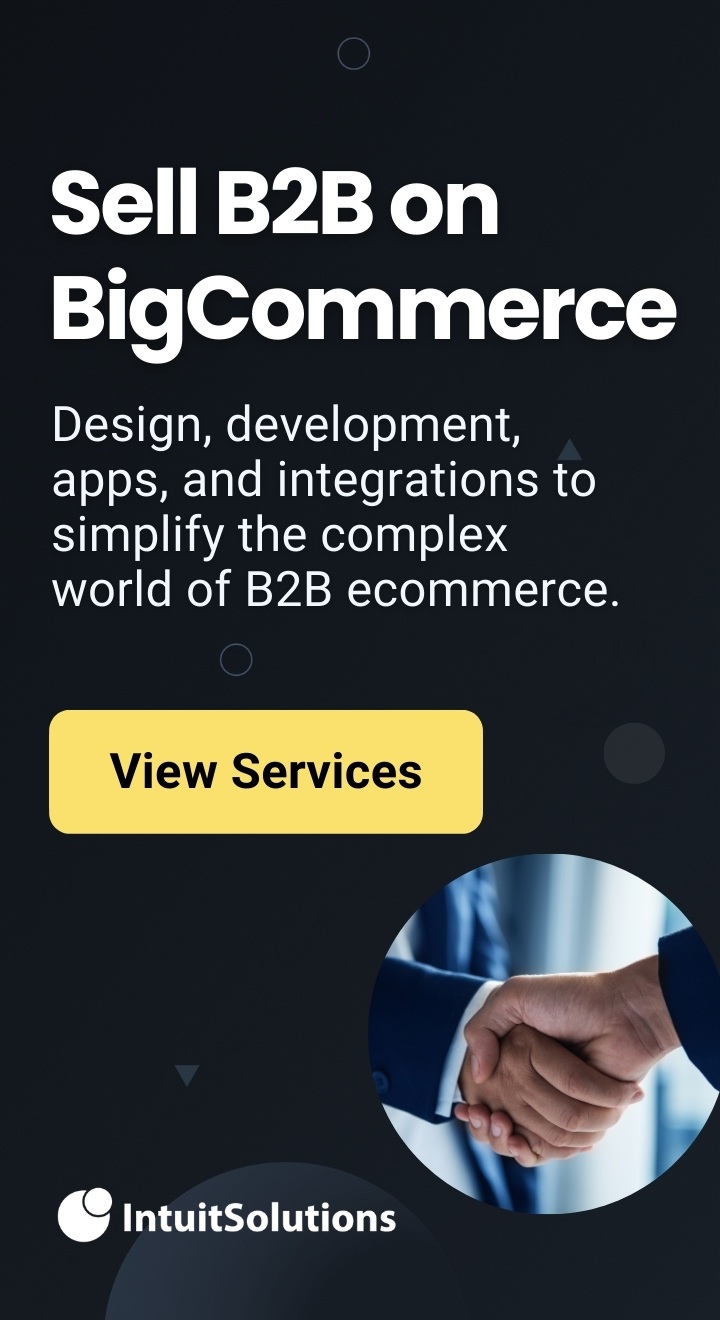If you sell B2B online, you know that ecommerce platforms and tools aren’t always a seamless fit for your business model. So when prospective clients with B2B businesses learn that we exclusively work on BigCommerce, they want to know: is this really the best platform for my business?
Our answer is yes. BigCommerce is a great fit for B2B. It’s a convenient SaaS with enough flexibility to compete with self-hosting – plus, it has better native capabilities, more flexible payment options, and greater ease of customization than other platforms.
BigCommerce Has Better Native Capabilities For Customer Segmentation
B2B companies often have more complex merchandising and pricing needs than B2C. For example, a B2B business might only make certain Products available to certain companies, or negotiate a special rate with regular customers. It can be hard to translate these relationship-based aspects of a business into the ecommerce realm.
BigCommerce addresses these aspects with built-in features. It allows you to display what’s called conditional content and conditional pricing. You can hide and show Categories based on Customer Group, so that only the relevant Categories are shown to a given group. The same goes for pricing. You can easily set different pricing by Customer Group, ensuring that customers only see the most relevant pricing information.
More Flexibility With Payment Methods
Because BigCommerce is not a payments solution provider, they don’t try to fence you to a limited number of payment options that profit the ecommerce platform, not the merchant. BigCommerce offers the flexibility to keep your existing payment processing methods, or establish the ones you actually want to use.
This is an especially important concern for B2B merchants, since payment between businesses is more bureaucratic and less straightforward than B2C. For example, BigCommerce gives you the flexibility to:
- Accept offline payment methods like NET
- Accept a wide variety of payment options
- Keep existing protocols in place, such as a rate you previously negotiated with your bank
Better Code Means Better Performance
As solutions providers, we like working on BigCommerce because it provides us with a strong foundational code base. Part of this is that BigCommerce has a great API that is constantly updated and improved. Since an API is the foundation for many of the apps and integrations that developers write, having a good one makes it easier to write code that works with a particular platform.
Why is this important? On the merchant end, it means BigCommerce already connects with a number of ERP, Accounting, and CRM systems, making it easy to manage your business using existing processes. And, more generally, it means developers find it easier to build software that meets needs we identify in the market.
BigCommerce also has Stencil, a high-performing, modern framework that is optimized for SEO and mobile conversions. With Stencil, BigCommerce sites load faster and perform better out-of-the-box. And because its code is cleaner, our developers are able to more easily customize each site.
BigCommerce Allows For A Wide Variety of B2B Customizations
As solutions providers, we like working on the BigCommerce is because it’s easy to extend and customize the platform. Here are some of the most important types of customizations for B2B and why we’re able to do them on BigCommerce.
Show B2B Customers The Most Relevant Information
As discussed above, BigCommerce natively allow you to use Customer Groups to restrict Categories and Pricing to the right customers. But, because of the platform’s customizability, our developers are able to go in and create further restrictions. This allows us to do things like:
- Only display certain Products to certain Customer Groups
- Restrict certain Shipping or Payment Options to Customer Groups
- Show and hide Payment, Pricing, or Shipping Options based on the order’s destination or what warehouse it originates from
Another Huge Advantage: Customizing The Checkout
Virtually all ecommerce platforms let you write plugins, customizations, and apps – that’s why they have app stores. But unlike Shopify (its main competitor), BigCommerce allows developers to customize the checkout page.
Why is it important to customize the checkout page? The checkout page is the last phase of the purchase pipeline and it’s where many customers abandon cart. Customizing it helps B2B customers buy in a way that works for them, with no extra effort on the merchant end. For example, checkout customizations let customers:
- Select non-standard payment or shipping options
- Pay by purchase order at Checkout
- Easily save a record of what customers buy
These things make B2B buying a lot easier, but they’re impossible on platforms that don’t let you customize the checkout.
UX Customizations Make Shopping Easy and Fun
A major buzzword in B2B ecommerce is “consumerization” – design and development initiatives that provide B2B stores with the type of enjoyable shopping experiences typically associated with B2C.
Today, the most successful online B2B merchants are challenging the idea that design and UX are only important for B2C. But, to do this, you need UX customizations that address real B2B pain points, such a helping customers order in large quantities or easily reorder things they buy regularly.
That’s where solutions providers like IntuitSolutions come in. Because of BigCommerce’s built-in extensibility, we’ve been successful in building apps and add-ons that help B2B merchants create the shopping experience that they need in order to grow.
Get On The Best Platform For B2B Sales!
Do you run a B2B site and want a free consultation on how you can make more money? Thinking about making the switch from B2C to B2B? We can help. Whether you need a full site redesign or the perfect app or add-on, our experts will find you a solution that works with your business goals and budget. Contact our team today!










